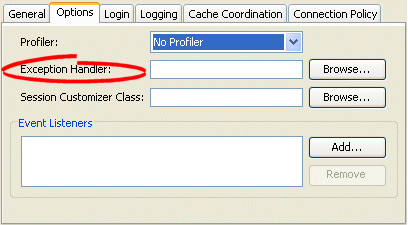|
Oracle TopLink Developer's Guide
10g Release 3 (10.1.3) B13593-01 |
|
 Previous |
 Next |
|
Oracle TopLink Developer's Guide
10g Release 3 (10.1.3) B13593-01 |
|
 Previous |
 Next |
You can associate a single exception handling class with each session. This class must implement the oracle.toplink.exceptions.ExceptionHandler interface.
Table 77-11 summarizes which sessions support exception handler configuration.
Table 77-11 Session Support for Exception Handler Configuration
| Session | Using TopLink Workbench
|
Using Java
|
|---|---|---|
|
|
|
|
|
Session Broker and Client Sessions |
|
|
|
|
|
|
For an example exception handler implementation, see "Using Java".
For more information, see "Exception Handlers".
To specify the exception handler class in a session, use this procedure:
Select a session in the Navigator. Its properties appear in the Editor.
Click the Options tab. The Options tab appears.
Figure 77-6 Options Tab, Exception Handler field

Click Browse and select the exception handler class for this session.
Example 77-6 shows an example exception handler implementation. In this implementation, the exception handler always tries to reestablish the connection if it has been reset by peer, but only retries a query if it is an instance of ReadQuery. Note that this exception handler either returns the result of the reexecuted ReadQuery or throws an exception.
Example 77-6 Implementing an Exception Handler
session.setExceptionHandler(
new ExceptionHandler()
{
public Object handleException(RuntimeException exception)
{
if (exception instanceof DatabaseException)
{
DatabaseException dbex = (DatabaseException) exception;
if ((dbex.getInternalException() instanceof SQLException) &&
(((SQLException) dbex.getInternalException()).getErrorCode() == MyDriver.CONNECTION_RESET_BY_PEER))
{
dbex.getAccessor().reestablishConnection(dbex.getSession());
if (dbex.getQuery() instanceof ReadQuery)
{
return dbex.getSession().executeQuery(dbex.getQuery());
}
throw exception;
}
}
throw exception;
}
}
);
|
Note: Unhandled exceptions must be rethrown by the exception handler code. |